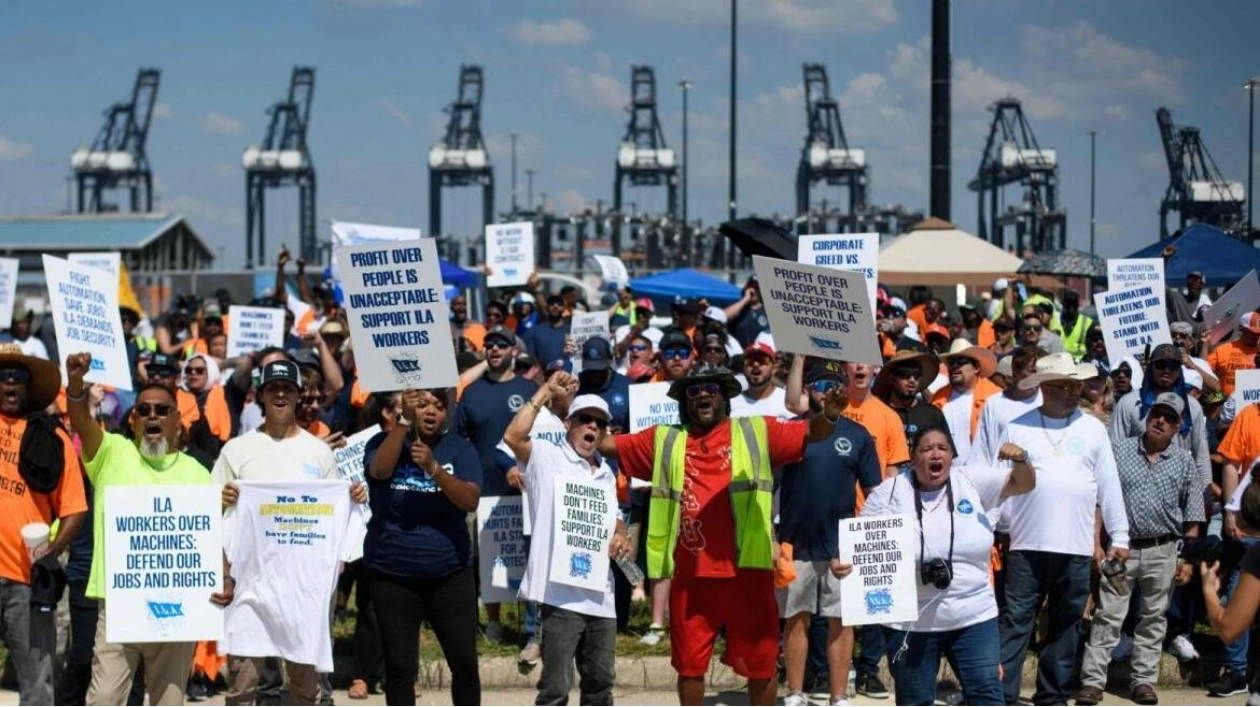President Joe Biden's administration is putting pressure on US port employers to increase their offer to secure a labor deal with dockworkers who have been on strike for a second day, effectively choking off half of the country's ocean shipping. The strike by the International Longshoremen's Association (ILA) union has halted the movement of goods ranging from food to automobiles across numerous ports from Maine to Texas, a disruption that analysts predict will cost the economy billions of dollars daily.
Over 38 container vessels were already waiting at US ports by Tuesday, compared to just three on Sunday before the strike began, according to Everstream Analytics. 'Foreign ocean carriers have made record profits since the pandemic, when longshoremen put themselves at risk to keep ports open. It’s time those ocean carriers offered a strong and fair contract that reflects ILA workers’ contribution to our economy and to their record profits,' Biden stated in a post on X late Tuesday. He directed his team to monitor for potential price gouging benefiting foreign ocean carriers, according to the White House.
The ILA, representing 45,000 port workers, initiated the strike just after midnight on Tuesday following the collapse of negotiations with the United States Maritime Alliance (USMX) for a new six-year contract. USMX had proposed a 50% wage increase, but ILA's leader, Harold Daggett, asserted that the union is demanding more, including a $5 per hour raise annually over the six-year contract and an end to port automation projects that jeopardize union jobs. 'We are prepared to fight as long as necessary, to stay out on strike for whatever period of time it takes, to get the wages and protections against automation our ILA members deserve,' Daggett declared on Tuesday.
Hundreds of dockworkers rallied at a New York City area shipping terminal in Elizabeth, New Jersey, on Tuesday, brandishing signs and chanting slogans like 'ILA all the way!' as music played and vendors sold food. Morgan Stanley economists noted in a late Tuesday report that the strike could impact growth and inflation 'but only if it is long-lasting,' adding that the implications for transport should be limited unless the strike continues. Retailers, accounting for about half of all container shipping volume, have been implementing backup plans to mitigate the strike's impact as they approach the winter holiday sales season.
Shares of shipper Maersk dropped 2% in Copenhagen on Wednesday, while ZIM Integrated Shipping fell 4% in pre-market trading in New York. The strike, the ILA's first major stoppage since 1977, is causing concern among businesses that rely on ocean shipping for exports or essential imports. It affects 36 ports, including New York, Baltimore, and Houston, handling a variety of containerized goods from bananas to clothing to cars. Approximately half of US imports arrive via water, while 37% of exports are waterborne, according to Morgan Stanley. The walkout could cost the American economy about $5 billion daily, as estimated by JP Morgan analysts.
The National Retail Federation urged Biden's administration to use its federal authority to halt the strike, warning of 'devastating consequences' for the economy. Republicans, including Virginia Governor Glenn Youngkin, have also called on Biden to end the strike, highlighting its economic impact. Biden has consistently stated he will not intervene. The US Department of Agriculture said on Tuesday it does not anticipate significant changes to food prices or availability in the near term.






